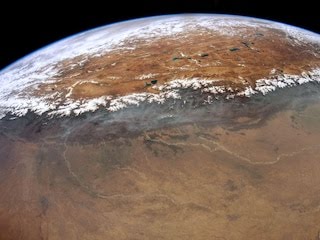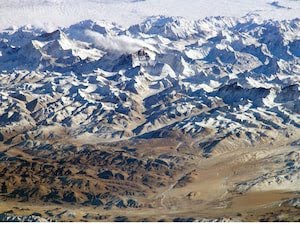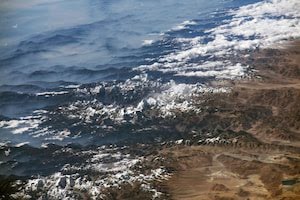See the view of Himalayas from space, Ganga river and Tibetan plateau are also visible, NASA astronaut recorded

You must have seen many pictures of the Himalayas and Mount Everest, but have you ever seen it from space? These days, a picture is going viral on social media, in which the Himalayas, Mount Everest, River Ganga and the Tibetan Plateau are visible from space. The pictures are so adorable that you will go crazy. These pictures were taken by American astronauts from the International Space Station. These are really thrilling pictures.
These pictures have been shared on social media platform X with @WorldAndScience, which have been viewed more than 50 thousand times so far. When we started investigating it, we came to know that these pictures are quite old. Detailed information about this was available on the portal of the American space agency NASA. It was revealed that in May 2012, astronaut Don Petit had captured this scene from the International Space Station. In this the snow covered peaks of the Himalayan mountains are visible. The Himalayas appear to extend for about 1000 kilometers.

Tibetan plateau and many lakes are also in the picture
River Ganga and its area are also visible in the picture, as well as the Tibetan Plateau and many lakes. High glaciers are also visible. Major rivers of the plains, Ganga, Ghaghra and some part of Gandak are also visible in it. You will be surprised to know that the lens with which Petit captured these pictures had a focal length of 16 millimeters. This is very close to the focal length of the human eye of 25 millimeters. That means, whatever you can see from space with the open eye, the same scene is visible in these pictures.
https://twitter.com/WorldAndScience/status/1741706579462828469?t=ncZe5p0wOsWdLwMX3W_lUg&s=19

Second picture is from 2017
According to NASA, the second photo was captured by astronaut Randy Comrade Bresnik in December 2017. Then he took the image of Mount Everest with a camera with 420 mm focal length. You can see that light clouds are visible over Mount Everest. Monsoon clouds that bring rain have not yet arrived in this area. However, southern winds have guarded some major valleys of the Tibetan Plateau, causing clouds to appear upward. Another reason for the air being clean on this day was that the air pollution in this area was washed away by the winds.







